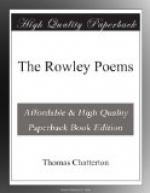Thenne, kneelynge downe, hee layd hys
hedde
Most seemlie onne the blocke;
370
Whyche fromme hys bodie fayre at once
The able heddes-manne stroke:
And oute the bloude beganne to flowe,
And rounde the scaffolde twyne;
And teares, enow to washe’t awaie,
375
Dydd flowe fromme each mann’s
eyne.
The bloudie axe hys bodie fayre
Ynnto foure parties cutte;
And ev’rye parte, and eke hys hedde,
Uponne a pole was putte.
380
One parte dydd rotte onne Kynwulph-hylle,
One onne the mynster-tower,
And one from off the castle-gate
The crowen dydd devoure:
The other onne Seyncte Powle’s goode
gate, 385
A dreery spectacle;
Hys hedde was plac’d onne the hyghe
crosse,
Ynne hyghe-streete most nobile.
Thus was the ende of BAWDIN’S fate:
Godde prosper longe oure kynge,
390
And grante hee maye, wyth BAWDIN’S
soule,
Ynne heav’n Godd’s
mercie synge!
AELLA:
A
TRAGYCAL ENTERLUDE,
OR
DISCOORSEYNGE TRAGEDIE,
WROTENN BIE
THOMAS ROWLEIE;
PLAIEDD BEFORE
MASTRE CANYNGE, ATTE HYS HOWSE NEMPTE THE RODDE LODGE;
[ALSOE BEFORE THE DUKE OF NORFOLCK, JOHAN HOWARD.]
PERSONNES REPRESENTEDD.
AELLA, bie Thomas Rowleie, Preeste, the Aucthoure.
CELMONDE, Johan Iscamm, Preeste.
HURRA, Syrr Thybbotte Gorges, Knyghte.
BIRTHA, Mastre Edwarde Canynge.
Odherr Partes bie Knyghtes Mynstrelles.
EPISTLE TO MASTRE CANYNGE ON AELLA.
’Tys songe bie mynstrelles, thatte
yn auntyent tym,
Whan Reasonn hylt[1] herselfe in cloudes
of nyghte,
The preeste delyvered alle
the lege[2] yn rhym;
Lyche peyncted[3] tyltynge
speares to please the syghte,
The whyche yn yttes felle
use doe make moke[4] dere[5], 5
Syke dyd theire auncyante lee deftlie[6]
delyghte the eare.
Perchaunce yn Vyrtues gare[7]
rhym mote bee thenne,
Butt eefte[8] nowe flyeth
to the odher syde;
In hallie[9] preeste apperes
the ribaudes[10] penne,
Inne lithie[11] moncke apperes
the barronnes pryde: 10
But rhym wythe somme, as nedere[12]
widhout teethe,
Make pleasaunce to the sense, botte maie
do lyttel scathe[13].
Syr Johne, a knyghte, who
hath a barne of lore[14],
Kenns[15] Latyn att fyrst
syghte from Frenche or Greke,
Pyghtethe[16] hys knowlachynge[17]
ten yeres or more, 15
To rynge upon the Latynne
worde to speke.
Whoever spekethe Englysch
ys despysed,
The Englysch hym to please moste fyrste
be latynized.




